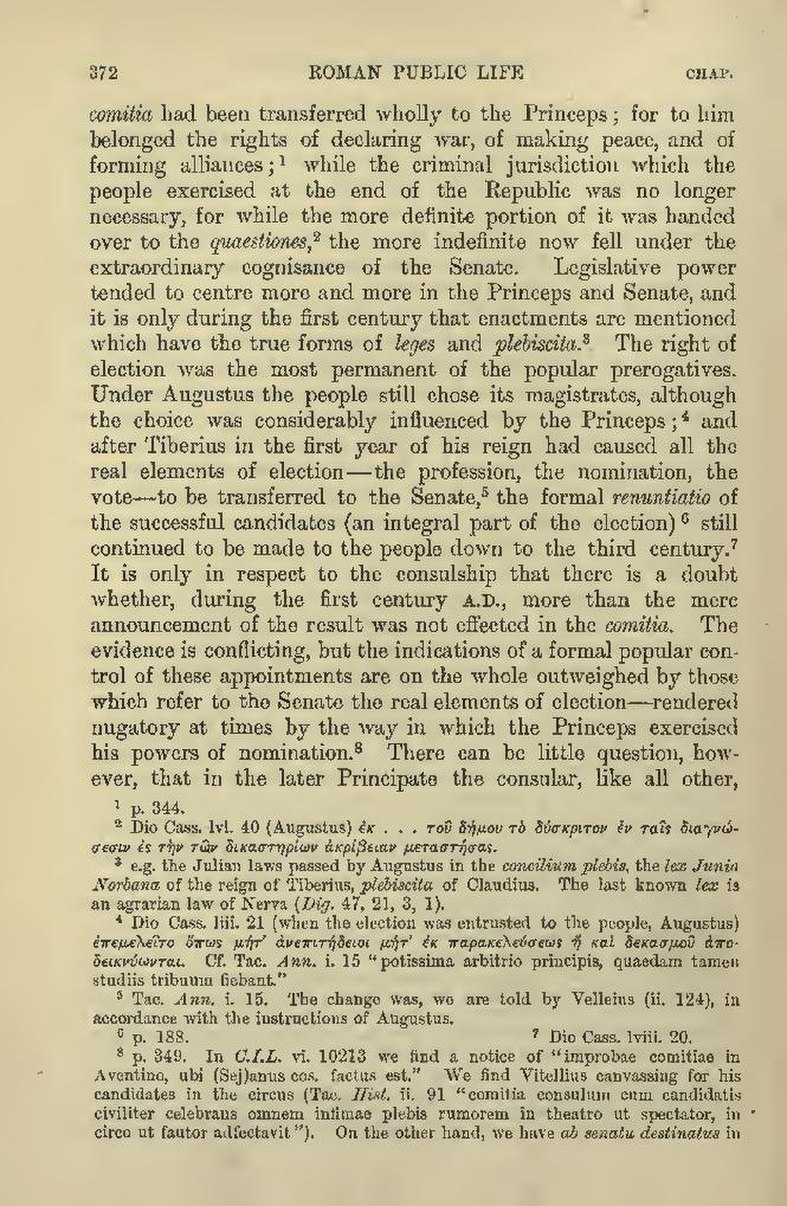comitia had been transferred wholly to the Princeps; for to him belonged the rights of declaring war, of making peace, and of forming alliances;[1] while the criminal jurisdiction which the people exercised at the end of the Republic was no longer necessary, for while the more definite portion of it was handed over to the quaestiones,[2] the more indefinite now fell under the extraordinary cognisance of the Senate. Legislative power tended to centre more and more in the Princeps and Senate, and it is only during the first century that enactments are mentioned which have the true forms of leges and plebiscita.[3] The right of election was the most permanent of the popular prerogatives. Under Augustus the people still chose its magistrates, although the choice was considerably influenced by the Princeps;[4] and after Tiberius in the first year of his reign had caused all the real elements of election—the profession, the nomination, the vote—to be transferred to the Senate,[5] the formal renuntiatio of the successful candidates (an integral part of the election)[6] still continued to be made to the people down to the third century.[7] It is only in respect to the consulship that there is a doubt whether, during the first century A.D., more than the mere announcement of the result was not effected in the comitia. The evidence is conflicting, but the indications of a formal popular control of these appointments are on the whole outweighed by those which refer to the Senate the real elements of election—rendered nugatory at times by the way in which the Princeps exercised his powers of nomination.[8] There can be little question, however, that in the later Principate the consular, like all other,.]. Cf. Tac. Ann. i. 15 "potissima arbitrio principis, quaedam tamen studiis tribuum fiebant."]*
- ↑ p. 344.
- ↑ Dio Cass. lvi. 40 (Augustus) [Greek: ek . . . tou dêmou to dyskriton en tais diagnôsesin es tên tôn dikastêriôn akribeian metastêsas
- ↑ e.g. the Julian laws passed by Augustus in the concilium plebis, the lex Junia Norbana of the reign of Tiberius, plebiscita of Claudius. The last known lex is an agrarian law of Nerva (Dig. 47, 21, 3, 1).
- ↑ Dio Cass. liii. 21 (when the election was entrusted to the people, Augustus) [Greek: epemeleito hopôs mêt' anepitêdeioi mêt' ek parakeleuseôs hê kai dekasmou apodeiknyôntai
- ↑ Tac. Ann. i. 15. The change was, we are told by Velleius (ii. 124), in accordance with the instructions of Augustus.
- ↑ p. 188.
- ↑ Dio Cass. lviii. 20.
- ↑ p. 349. In C.I.L. vi. 10213 we find a notice of "improbae comitiae in Aventino, ubi (Sej)anus cos. factus est." We find Vitellius canvassing for his candidates in the circus (Tac. Hist. ii. 91 "comitia consulum cum candidatis civiliter celebrans omnem infimae plebis rumorem in theatro ut spectator, in circo ut fautor adfectavit"). On the other hand, we have ab senatu destinatus in
